Notorious (1946)
Directed by: Alfred Hitchcock
Written by: Ben Hecht
Starring: Cary Grant, Claude Rains, Ingrid Bergman, Leopoldine Constantin
HCF REWIND NO. 214: NOTORIOUS [US 1946]
RUNNING TIME: 101 min
AVAILABLE ON DVD
THE HITCHCOCK CAMEO: A guest at the grand party in Alex Sebastian’s mansion, lifting a glass of champagne to sip at the champagne table, then quickly leaving
REVIEWED BY: Dr Lenera, Official HCF Critic
Alicia Huberman, the American daughter of a convicted Nazi spy, meets government agent T. R. Devlin at a party. He wants her to infiltrate an organisation of Nazis who have moved to Brazil after World War II and may be up to something. When Alicia refuses to help the police, Devlin plays recordings of her fighting with her father and insisting that she loves America. While awaiting the details of her assignment in Rio de Janeiro, Alicia and Devlin fall in love, though his feelings are complicated by his knowledge of her promiscuous past. Devlin gets instructions to persuade her to seduce Alex Sebastian, one of her father’s friends and a leading member of the group who used to be in love with Alicia…..
The great French director, in his book-length interview with Alfred Hitchcock, called Notorious the: “quintessence of Hitchcock” . It’s certainly his most personal film to that date, more a harsh, cynical love story – a love story filled with betrayal, deceit and pain – than a suspense thriller about spies and secret Nazi plots in Rio De Janeiro, a film into which the director seems to be pouring his feelings and anxieties. It’s a much more low-key film than Spellbound, and much simpler on the surface, though actually more mature and intelligent. It contains only a few of Hitchcock’s trademark suspense sequences and doesn’t wring much actual action from its situation [the first time I saw it, I was hugely disappointed that the one killing occurred totally off-screen, especially since the film seemed to indicate that it would be a major sequence], it’s nonetheless one of those films where no scene is extraneous, with everything bit and piece contributing to the whole, which has great sophisticated smoothness. It’s terrific old-style escapism, but also very deep in its emotions and astonishingly adult for the time too. It’s not as fun as Spellbound, but it’s just as good a film.
David O’ Selznick gave Hitchcock a file of undeveloped stories he had given up on making films out of, and one of them was a short story called The Song of the Dragon by John Taintor Foote which had appeared as a two-part serial in the Saturday Evening Post in November 1921. It told of an actress who is recruited by a theatre producer working for the CIA to seduce the leader of a gang of enemy saboteurs. Hitchcock and his Spellbound writer Ben Hecht wrote a screenplay, and added a great deal, notably the idea of the villains having uranium. They found out that uranium was the principal ingredient of an atomic bomb before it was common knowledge and were shadowed by the FBI for months. Selznick got the playwright Clifford Odetts to work on the script, but Hitchcock used hardly any of his material. The heroine Alicia was actually originally a prostitute, but the censors soon put paid to that idea. Selznick, who had never liked the heroine being a loose woman, lost interest in the project and sold it to RKO, and Hitchcock got to be his own producer for the first time, though Selznick still tried to get Joseph Cotton, rather than Cary Grant, to star, and did ensure that Claude Rains, rather than Hitchcock’s choice Clifton Webb, played the main villain. Hitchcock became infatuated with the married Ingrid Bergman, who was having an affair with the photographer Robert Capa at the time, and unusually deferred to her on many occasions. The film was another critical and commercial hit for Hitch.
If you look at Notorious as a thriller, than it really does take its time, with over half an hour passing before Alicia embarks on her mission. However, at heart the film is a love story, so the scenes of Alicia and Devlin beginning their odd relationship are essential. When the film soon gets to Rio De Janeiro, the atrocious back projection annoys, and there’s so much of it in this film, with blurry footage of the city and people going about their business wobbling behind the main cast members. It’s probably the only major problem with Notorious when viewed today, but it’s a major one. Otherwise it seems quite modern in its attitudes, with a bitter cynicism and certainly no idealised Hollywood view of romance like Spellbound. It’s surprising that the Production Code allowed a film where the CIA blatantly indulge in prostitution, with quite on-the-nose dialogue, and of course there’s the famous the two-and-a-half minute kissing sequence where Hitchcock had Grant and Bergman stop every three seconds so it got around the Production Code’s rule of no kisses lasting more than three seconds. The stars kiss, nibble and nuzzle each other while partly improvising dialogue in a scene which feels amazingly intimate, yet it’s all very guarded and can hardly be called romantic because Devlin doesn’t seem to want to return Alicia’s love for him. To her, he’s her redemption from a worthless life of hedonism, but to him, she’s a slut who is unworthy of his love, and he even hates himself for having feelings for her.
Once Alicia finds herself inside the house of the CIA’s quarry, Notorious begins to slowly build up the tension [there are echoes of Rebecca with another heroine stuck in a house full of secrets], wringing suspense from the simplest things, like Alicia locating a key and Alex trying to hold her hands, one of whom holds the key. There’s a fabulous party scene, opening with another great crane shot where the camera swoops down from a high second floor balcony to a close-up of said key in Alicia’s hand, where Devlin and Alicia have to find out what’s in the wine cellar, and the amount of quiet suspense derived from the party possibly running out of champagne bottles is extraordinary. The villains eventually find out what’s going on and start to poison Alicia, leading to a climax which mostly involves three people quietly going down some stairs, but it’s absolutely riveting, and morally interesting too because not only are we worried that the Nazis in the room downstairs may see Devlin and Alicia, but are also a little worried for Alex too, the guy who has been trying to kill Alicia but whom we know will be in big trouble if his letting an American spy in the house, and marrying of her, is discovered. The film’s final lines: “Alex, will you come in, please? I wish to talk to you”, are very chilling. Alex actually seems subordinate to his mother, and Notorious features the first major sinister mother role [there had been some minor ones earlier] in a Hitchcock film. His own mother died in 1942, and Hitchcock seemed to subsequently try to work out his confused feelings for her in some of his films, though those feelings rarely seem to be very nice!
In fact Alex seems like a nicer chap than Devlin for much of the time. His love for Alicia seems more genuine and simpler than Devlin’s, who gets her to sleep with another man, only to despise her low morals when she does. Devlin is a bastard throughout, but it’s part of what makes the story so interesting. You’re virtually shouting out at the screen for him to come to his senses, and when he finally does at the end, you feel like cheering. The scene is probably the most pure of Hitchcock’s many romantic scenes, an unashamed declaration of love which has been a long time in coming, though dare I say it the couple have still probably got a lot of issues, most of them coming from Devlin, to work out. Ted Tetzlaff’s camera gets up close and personal in this wonderful scene, as it does throughout: a scene where Alicia’s visits the CIA [okay, the CIA is not mentioned by name but it’s quite obvious] office to tell Devlin and the others that Alex had proposed to her, is mostly played out in close-ups of Alicia and Devlin. Hitchcock has fun with such moments as Alicia waking up from a hangover and seeing Devlin, backlit menacingly and upside down, and the poisoned and very weak Alicia trying to escape the house and seeing the frightening shadows of Alex and his mother merging into one, but none of his directorial gimmicks seem much like gimmicks, they seem an essential enhancement of the scene they’re in, though Grant’s introduction, us just seeing the back of his head for over a minute, is a superb star introduction.
Even more than in Suspicion, Grant is fantastic. He exudes exterior coldness and interior torment. However Bergman, who has never been more lovingly shot, nor sensually presented on screen, is even better. She makes her character, loose moralled or not, totally sympathetic, someone who is desperate for love and appreciation. Hitchcock wanted Bernard Herrmann, who would later become his most famous musical collaborator, to score Notorious, but he ended up with Roy Webb, who does a fine job. Much of the film’s first half is left un-scored, Webb preferring to use source music, often of a Brazilian nature, to comment on the on-screen action on those occasions where he uses music at all. The second half has some great dramatic suspense cues though Webb holds back on using his central love theme. Elegant, bitter, yet thoroughly entertaining as long as you’re prepared to be patient, Notorious is one of those Hitchcock films that may not impress too much at first but which gets better with each viewing, its quiet power and its universal emotions having perhaps more resonance as one gets older. In the end, it’s about how three people try to deal with love, and what’s more universal than that? It was remade for TV in 1992, and Mission Impossible 2 partly remade it in its first half, even using some of the same dialogue.

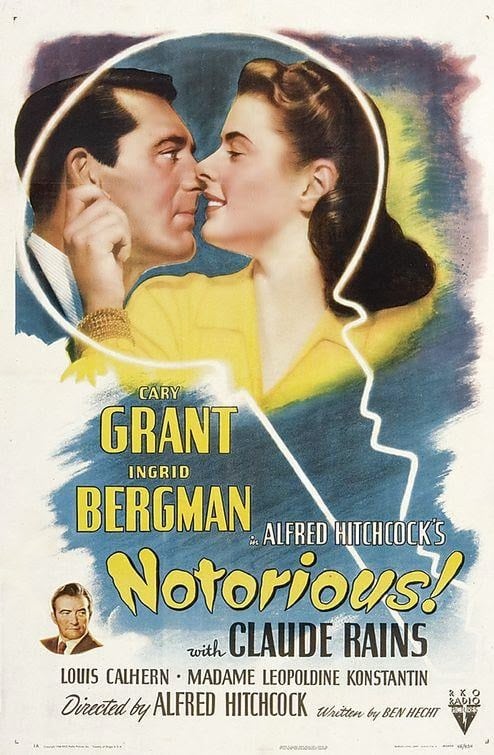
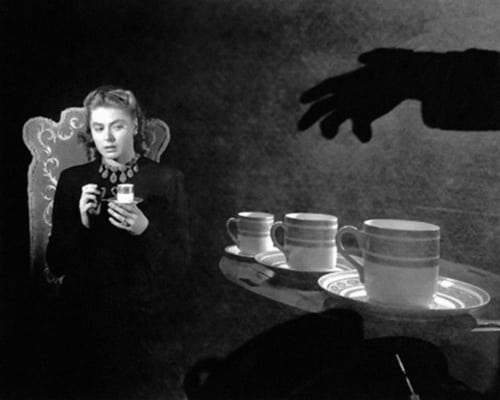
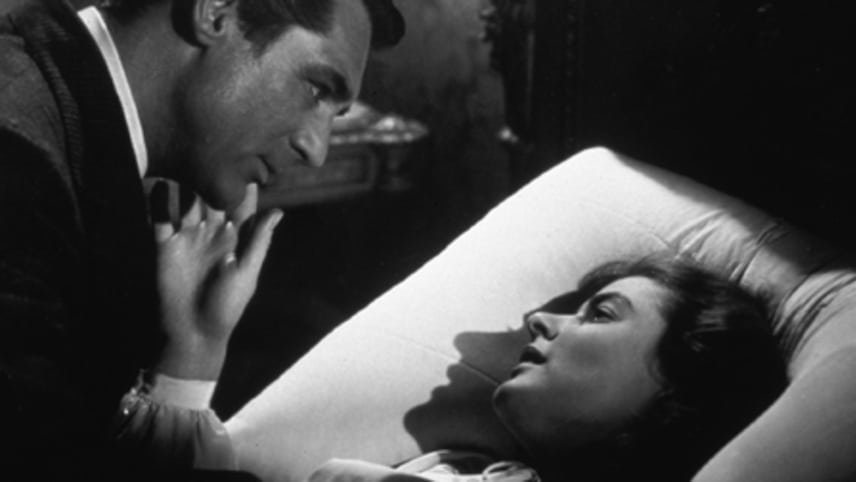



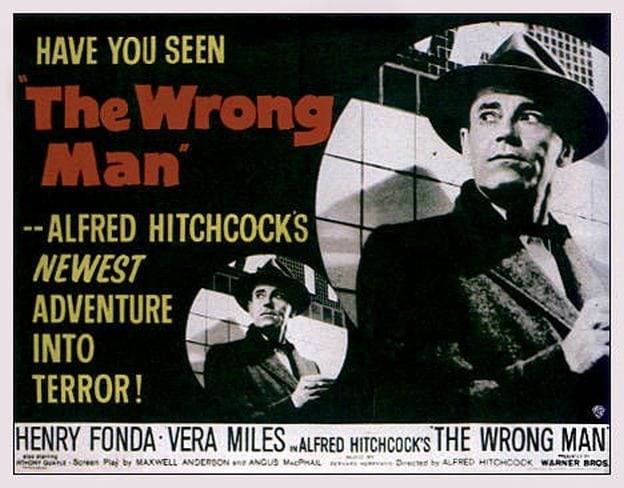
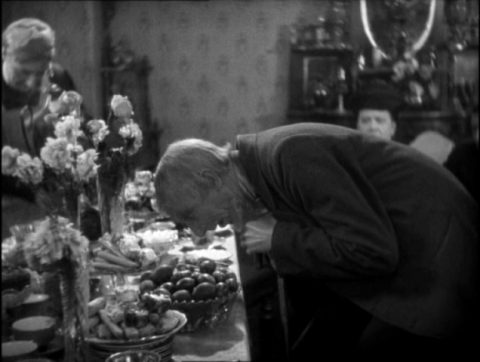
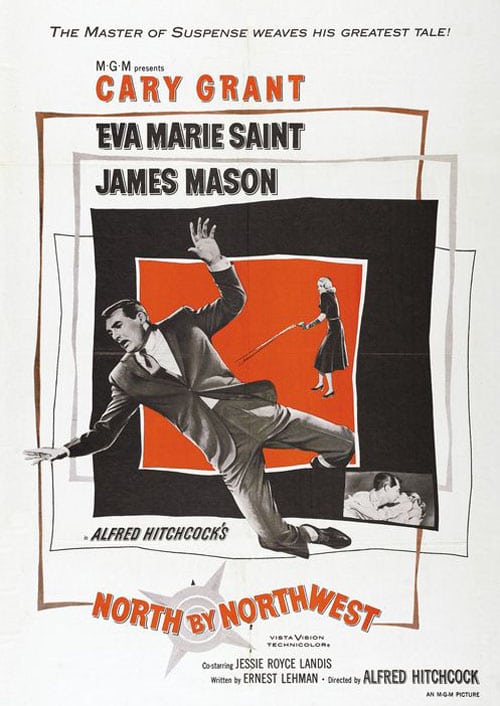
Be the first to comment